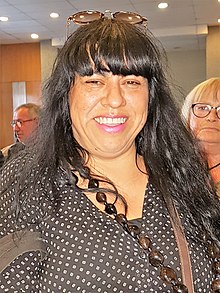Malú Urriola
Malú Urriola | |
|---|---|
 Urriola in 2017 | |
| Born | Marilú Urriola 9 June 1967 Santiago, Chile |
| Died | 21 July 2023 (aged 56) |
| Language | Spanish |
| Genre | Poetry |
| Notable awards | Pablo Neruda Award (2006) |
María de la Luz Urriola González (9 June 1967 – 21 July 2023), most often known as Malú Urriola, was a Chilean poet, screenwriter and academic. She wrote seven books of poetry and won the 2006
Early life and academia
Malú Urriola was born in Santiago on 9 June 1967.[1] She began writing at the age of 14 and received a scholarship from the poetry workshop of the Pablo Neruda Foundation in 1986.[2]
Urriola earned a master's degree in scriptwriting in
Writing career
Urriola published her first book, Piedras rodantes, in 1988 when she was 21. In 1994, she received a grant from the Fund for the Development of Arts and Culture (FONDART) to publish her book Dame tu sucio amor.[2]
Urriola received another FONDART grant in 2002 for her project with Nadia Prado, Poesía es +: Lectura de poesía desde globos aerostáticos. The project was an
Urriola wrote scripts for feature films, series and soap operas. She was a writer for the television programs Los Venegas and La vida es una lotería. In 2004, she received the Best Television Contribution Award from the Servicio Nacional de la Mujer for her 2003 script for "Sofía (Una historia de maltrato a la Mujer)", from the Televisión Nacional de Chile series Cuentos de Mujeres.[2] She also wrote for The Sentimental Teaser (1999), Los simuladores (2005–2006) and Lola (2007–2008). Her works for theater include El último beso (2001) and La noche del accidente (2011).[1]
Urriola's works have been included in a number of poetry anthologies, including 16 poetas chilenos, Antología de la poesía latinoamericana del siglo XXI, Antología de poetas chilenas. Confiscación y silencio, and Mujeres poetas de Chile: muestra Antológica 1980–1995.[2]
Urriola died on July 21, 2023, at age 56.[3]
Awards
Urriola won the Pablo Neruda Award in 2006.[4] Her writing also earned her the Santiago Municipal Literature Award and an award from the Consejo Nacional del Libro y la Lectura for her collection Nada in 2004.[5][1] In 2019, she received the Premio a la Trayectoria Poética Pablo Neruda.[6]
Works
- Piedras rodantes (1988)
- Dame tu sucio amor (1994)[2]
- Hija de perro (1998)[7]
- Nada (2003)[5]
- Bracea (2007)[2]
- Cadáver exquisito (2017)
- El cuaderno de las cosas inútiles (2022)
- La luz que me ciega with photographer Paz Errázuriz (2010)[1]
- La noche en el espejo (2016)[1]
References
- ^ a b c d e f "Poemas de Malú Urriola". Isliada. 29 May 2023. Archived from the original on 21 June 2023. Retrieved 20 June 2023.
- ^ a b c d e f g "Malú Urriola (1967– )". Memoria Chilena. Biblioteca Nacional de Chile. Archived from the original on 22 September 2019. Retrieved 20 June 2023.
- ^ Retamal N., Pablo (21 July 2023). "Muere la poeta y guionista chilena Malú Urriola a los 56 años". La Tercera. Archived from the original on 21 July 2023. Retrieved 21 July 2023.
- ^ Marín Naritelli, Francisco (17 September 2017). ""Cadáver exquisito" de Malú Urriola: la soledad de una escritura liberada". El Mostrador (in Spanish). Archived from the original on 21 June 2023. Retrieved 21 June 2023.
- ^ a b "Malú Urriola, poeta y guionista: «Nunca a Mistral se le ha hecho un homenaje público como a Parra, eso lo dice todo»". El Desconcierto (in Spanish). 9 March 2018. Archived from the original on 21 June 2023. Retrieved 21 June 2023.
- ^ "Malú Urriola, escritora y guionista: "Quienes ansían el poder no necesariamente saben de política"". BioBioChile (in Spanish). 9 September 2020. Archived from the original on 21 June 2023. Retrieved 21 June 2023.
- ^ "Hija de la pasión". Página/12 (in Spanish). 29 April 2011. Archived from the original on 21 June 2023. Retrieved 21 June 2023.
